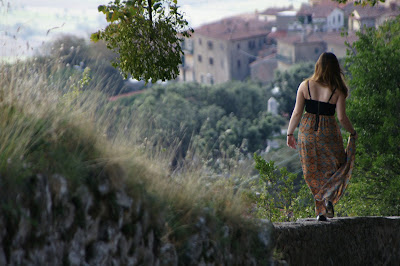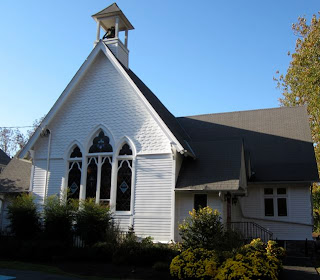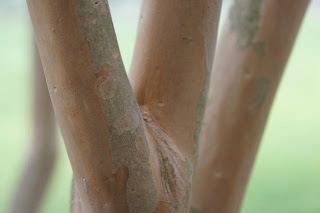new posts in all blogs
Viewing: Blog Posts Tagged with: St. Johns Presbyterian Church, Most Recent at Top [Help]
Results 1 - 10 of 10
How to use this Page
You are viewing the most recent posts tagged with the words: St. Johns Presbyterian Church in the JacketFlap blog reader. What is a tag? Think of a tag as a keyword or category label. Tags can both help you find posts on JacketFlap.com as well as provide an easy way for you to "remember" and classify posts for later recall. Try adding a tag yourself by clicking "Add a tag" below a post's header. Scroll down through the list of Recent Posts in the left column and click on a post title that sounds interesting. You can view all posts from a specific blog by clicking the Blog name in the right column, or you can click a 'More Posts from this Blog' link in any individual post.

Nine or so months ago, Dr. Nicole Duran quietly slipped into her role as a transitional minister for my own St. John's Presbyterian Church and—without overt fanfare—changed the lives of many. She never gave the expected sermon. She brought intelligence to history and now to the stories of then. She found an old stone baptismal font long wasting away on the church property and installed it to its proper glory—simply, almost matter of fact. Nicole engaged the young with words and seeds, felt boards and icons. She visited those who had fallen ill, spoke eloquently and with genuine emotion at funerals, inquired after others, attended to small fractures and bigger ones, and listened. Nicole Duran is not an overt entertainer; she doesn't need to be. She is, instead, a quiet, never self-congratulatory innovator, someone who has something to say, and how I have loved paying attention to the connections her fine mind makes, how I have loved the resonant power of her messages—relevant, real, and searching.
Today Nicole gave an extraordinary, alive, personal Easter Sunday sermon—looked at us through the thick black frames of her glasses and said precisely what she thought about religion today, the role of a holy place in our lives, the difference between seeking out the familiar for familiarity's sake and finding faith in the changing and new. And then, during communion, she invited every person in that quiet church to take a single flower from so many flower-filled vases and lace it into the netting of a large wooden cross she'd had built for us. Tulips, roses, carnations, twizzlers of blue and red, striped petals—one by one we laced our flowers in, and when we were done, that cross was alive, the dark day was bright, and we had lived Easter.
People touch our lives. Sometimes they don't know just how much they do, or why. I will never forget Nicole Duran—transitional but not temporary—nor this particular Easter day. She is a woman walking a stone wall in a simple dress, lifting her hopes—for us—to the sky.
I sat in church remembering my friend
Mike Yasick. I thought about the thousands of people searching for one last conversation with him, for a moment with him, for a chance to say goodbye. Thousands of people because Mike was that kind of guy. He brought sun into a room. He demonstrated, repeatedly, why it is far more rewarding, in this life, to be a force of good. Negativity is all sharp edges. Unprovoked cruelty solves no problems. Unkindness is unkarma. Why throw spears when there's a bowl of chocolate near? Why not slice the thorns off roses? Why not laugh? Why not make somebody happy?
Are you superb? As I sat there thinking about Mike, Miyuki Hoshimoto, a gorgeous soprano, sang "Agnus Dei." I watched her, but mostly I watched the other members of the choir, their faces tilted at angles, their heads rising and lowering with the notes. That, I thought, is what unburdened generosity looks like. It is the shape of appreciation, when envy will not float. There was the beauty of the song; there was the beauty of those who listened.
It was a necessary appeasement on a day when so many mourn the loss of a significant good.
Earlier this week I took a walk with my little point and shoot to document my neighborhood for a friend. This is my house, this is my street, this is my church, this is my office, I said. And I loved the sound of each camera snap.
So that this, yes, is my church, my own St. John's, and this is where, earlier today, we came together to remember the life of Mike Ruhl, a man described by all who knew him (and by those conducting the service) as extraordinarily good. Good being a big word. Good being the
biggest word. Good being how we think of those who actively listen and overtly care, those who want the right things and work on their behalf, those who love their families, those who leave us with grace, those who purify us by their presence. Mike Ruhl was all those things, and by his wife and son, by his sister and mother, niece and nephews, by his co-workers, by his friends, he will be forever missed. His spirit is still out there, on this blue-sky day. But oh, he will be missed.
After the service, those who had joined together—seamlessly, under the leadership of a compassionate minister and with the guidance of Lisa, Mike's wife—stood on the church lawn and in the parking lot. I stood too, and took it in. I thought of all the easy rancor in the world, the shots fired, the punches thrown, the lines that get crossed. I thought of those who confuse cruelty with wit, those who seize upon someone or something with one objective only—to trump, for a nano-instant, to gain nattering fame at another's expense. I thought of politics, and what it does to us. Anonymous comments. Spiced Twitter feeds. Failed apologies.
But there
is, in goodness, beauty. There
is, in kindness, intelligence. There are people like Mike Ruhl who crowd a church on a blue-sky day to be celebrated, to be remembered, to instruct us.
I turn my eyes in that direction.
St. John's Presbyterian Church celebrated Reverend Victor Wilson's twenty years with us today—and said goodbye to a family it is impossible not to love as Victor gave his final sermon. Morning and evening were Victor's themes. The responsibility we all have to carry memory forward, not as a burden, but as a gift. The Wilsons will live among mountains now, birds, open air, artists, dulcimer songs. They will visit with their beautiful girls, walk Carolyn's children to school, bless Katherine's upcoming wedding to Sean.
Will you grow old with me? Victor asked Jane, his fabulous red-headed wife, at his sermon's close.
And I thought to myself that that is perhaps the most romantic question a man can ask a wife.
Health and happiness, Victor and Jane.
1) I will get to Body Combat because I have failed to Zumba all week long, because I have eaten too much, because I have been at this desk pounding, pounding, but even my fingers are fatter than they were.
2) I will see beautiful Katherine at her wedding shower, even though I couldn't resist and bought her something not on the shower list. Katherine, I had to, and I hope you love it. (It's just so
you.) I will also see, at this same event, Katherine's beautiful sister, Carolyn, and their mother, Jane, and the next day I will see them all again, at St. John's Presbyterian Church, where we will be honoring Reverend Victor Wilson, standing in our pulpit one last time before retirement. It is a very special weekend. Want to see how special this bride-to-be is? Read her blog
Newlie. Find out how to smash some strawberries.
3) I will be driving, mid-shower, lightning speed but hopefully sans lightning, to Books a Million in Exton, PA, where I'll be hanging out between 1:30 and 3:00, should anyone want to stop by and talk about Spain, weather, paella, mysterious boys, Katherine's shower (just kidding, Katherine!), or a novel titled
Small Damages. The exact address: 298 Exton Square, Exton, PA 19341. Perhaps I'll see some of you there. Laura Schibinger, Books a Million GM, I have one thing to say to you: Dancing will only make it better. That's how dancing works.
It would be difficult to overstate just how this gift affected me today. Thank you to some very special people at my own extremely special St. John's Presbyterian Church.
A year or so ago, we sat among church friends and listened as Nader Engheta discussed his work in a field known as metamaterials, a discipline in which he is an acknowledged world leader. Maybe it was the glass of wine, but I thought I actually understood Nader that evening—thought I had climbed inside his world of physics and nanotechnology and gleaned something about the creation of the first actual invisible cloak.
Just like Harry Potter, I thought. Relying on literature, once again, to see me through.
But today Nader, who is a professor at my very own University of Pennsylvania, is featured
in a news story that reveals to me that, well, I understood nothing, and will never understand anything, about what this brilliant man is doing.
All I know is this: I'm proud to know him and happy to see him featured today. I excerpt three paragraphs from the Evan Lerner story, with the hope that you will find your way to the whole:
Just as a wave’s shape determines its properties, the shape of objects that a wave interacts with can further influence those properties. By designing shapes with features that are smaller than a given wavelength, metamaterials research could potentially develop “super lenses,” which have unprecedented magnification abilities, and “cloaking devices,” which can bend waves around an object, rendering it effectively invisible.
Although it’s been just a little more than a decade since the word “metamaterials” was coined, Engheta is now taking the research to the next level by establishing an even newer discipline he calls “metatronics.” Engheta and his research team recently built the first physical metatronic circuit, which manipulates light waves much the same way an electrical circuit in a computer or phone manipulates electrons.
As if cloaking devices weren’t futuristic enough, metatronics could also lead to the creation of objects that do math when you shine light on them. “What if we could make a material where we put a function in on one end, and get its derivative or integral out on the other? We’re working on that,” says Engheta.
We celebrate Mother's Day at St. John's Presbyterian Church with a youth-led service, happy songs, and roses. Today the bells rang, the singers sang, a young poet read, and, toward the end of it all, the youth went up and down the aisles giving roses to their moms. I was talking to the young man beside me at the time, and so my head was turned when I heard young Greta (who is Clara's sister and Paul and Julie's youngest daughter) saying Happy Mother's Day. Wearing her bright smile and her sweet blue dress, she delivered unto me this slender pink rose.
Sometimes the children of the world belong to all of us (or perhaps they always do). Today Paul, Julie, and Clara shared their Greta.
Happy Mother's Day to all who love the children of this world.
When St. John's Presbyterian Church invited me to speak for a Valentine's Day luncheon, we all envisioned a group of a dozen or so kind souls, gathered in a circle in the Carriage House. Our dozen has grown to nearly 80, I'm told, and I want to be sure that I deliver. And so, in found pockets of time this past week, I've been returning to my
Dangerous Neighbors research files and assembling a 20-image Centennial Philadelphia talk that melds the known with the unknown and in that way reveals my own fiction-making process.
Those of you who have read
Dangerous Neighbors (Egmont USA) know that key moments unfold within and outside of Operti's Tropical Garden, which stood on the margins of the Centennial grounds. Contemporary reporters described Operti's as "one of the handsomest places of amusement in Philadelphia. It was light and airy, and was handsomely decorated with frescoes and other paintings. Long lines of colored globes, each containing a gas jet, stretched across the interior beneath the ceiling, and shed a brilliant light upon the scene below. At the back a large waterfall dashed over the painted rocks, forming a beautiful cascade, and giving to the air on the hot nights of the summer a delicious coolness."
More than sixty performers led by a certain Signor Giuseppe Operti filled the place with music each night—the cascade being dimmed long enough for the music to soar, and then "spr(inging) into life again." Years later, working with those lines of description and this image, I was inspired to imagine a bird set free and all the nuanced consequences. From
Dangerous Neighbors:
Operti’s is an aromatic cove of high skies and blooms. Gas lanterns float like kites overhead. Potted trees shadow the paths. There are the bright flags of celosia and astilbe, the yellow sleeves of forsythia forced well past their season, begonias the color of dandelions and fire, and in the midst of it all, the orchestra stage. On every wall, frescoes, and in the very back someone has painted a rock cliff of schist and granite, then turned some sort of spigot on, so that water, real water, cascades down. The sound of Operti’s is gush and violins, the squeak of a chair, the leak of gas in a jet above, a stifled sneeze in the vicinity of the gardenias, and above that the silence of every single place that has ever lain in wait for an evening audience. By the time that Katherine has taken it all in, the girl, the mysterious mistress of the bird, has disappeared.
In the chill of this morning I drove to church and sat among people whom I consider to be dear and good friends—people whose lives and children I admire, people who make me laugh. I had been thinking, quietly, about the people who walk away from our lives, who no longer need what we have offered, who have found themselves moving past us toward something bigger, more enticing. I had been thinking, too, about the work I do for others, and how it can sometimes leave me feeling small, and I was sitting in the pews, my thoughts moving in and out, when Victor Wilson, our minister, began his sermon.
There, within his narrative about trust, were words I'd written years ago for a story in
Science and Spirit magazine. He'd mentioned, months ago, that he had found the piece, but I had no firm recollection of it, and so was surprised to sit within this echo of myself—the young me talking to the now me, saying these words:
It is so primal, this thing called trust. So basic to our survival. Without trust could we attach to one another, could we love? Could we forge societies and build institutions? Speak and believe that we’ve been heard? Would we set up housekeeping? Trade one thing for another? Lie in another person’s arms? Dare to procreate? Freely slip away to conjecture, to be curious, to dream? We’d be at war every day of our lives if we didn’t trust. We’d be anxious, jumpy people. We’d be on-guard, fenced-in solitaires — withered souls with narrowed eyes.
I don't want to live, I realized again today, without trust. I don't want the behavior of others to take it from me. I want, still, to believe in what is good, and I will, still, pursue that good, and if going forward some find me just a bit more guarded, a bit less eager to lavishly help, all it means is that I'm waiting for them to earn my trust.











Amen.
Sounds like a beautiful service.
Nicole Duran's wonderful Easter Sunday sermon is available for listening (MP3) and reading (PDF) on the Sermons page of the St. John's website at www.stjohnsdevon.com/sermons.htm
It seems that many of us at St. John's share in Beth's sincere appreciation of Nicole's remarkable qualities and are grateful for her time with us.